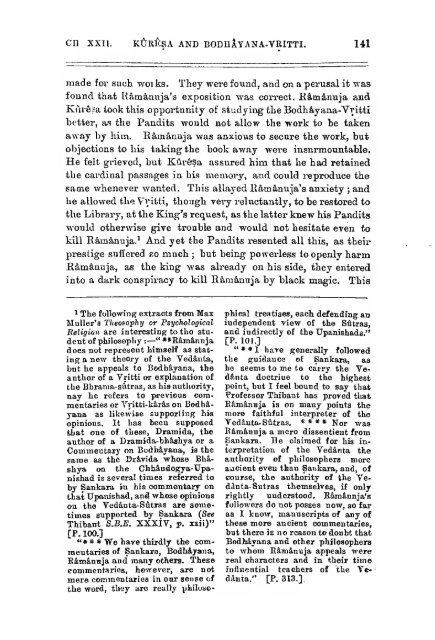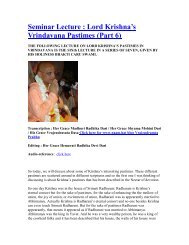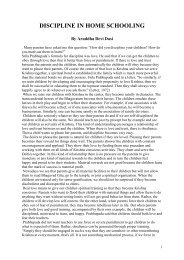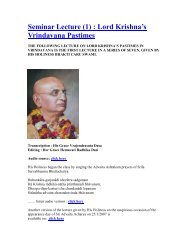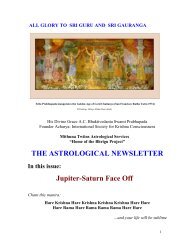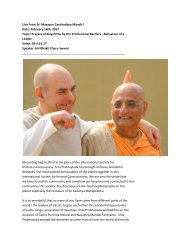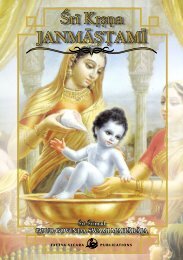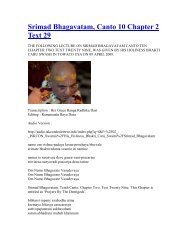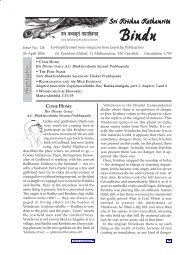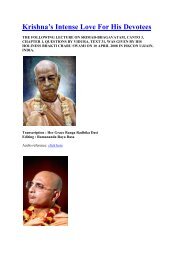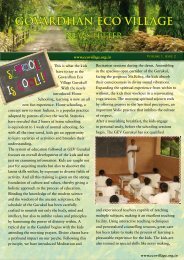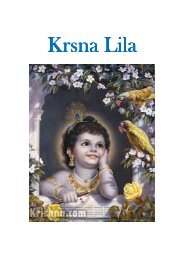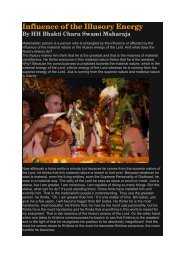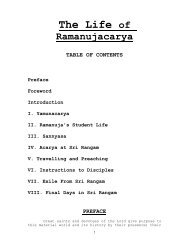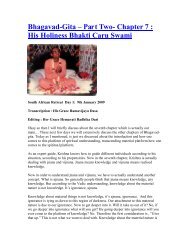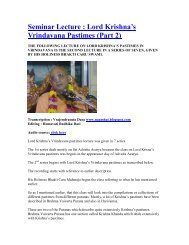the exponent of the Visishtadvaita philosophy - ebooks - ISKCON ...
the exponent of the Visishtadvaita philosophy - ebooks - ISKCON ...
the exponent of the Visishtadvaita philosophy - ebooks - ISKCON ...
Create successful ePaper yourself
Turn your PDF publications into a flip-book with our unique Google optimized e-Paper software.
CU XXII. KUllESA AND bodhAyana-vritti. 141<br />
made foi* aach woi ks. They were found, and on a perusal it -nas<br />
found that R:\m3,auja's exposition was correct. Elbm&nuja and<br />
Kurfi^a took this opportunity <strong>of</strong> Studying <strong>the</strong> Bodh&yana-Vritti<br />
Letter, as <strong>the</strong> Pandits -would not allow <strong>the</strong> work to be taken<br />
away by him. ESmanuja was anxious to secure <strong>the</strong> work, but<br />
objections to his taking <strong>the</strong> book away were insurmountable.<br />
He felt grieved, but Kur&Sa assured him that he had retained<br />
<strong>the</strong> cardinal pa-ssages in his memory, and could reproduce <strong>the</strong><br />
saoie whenever wanted. This allayed Il£im3,nuia's anxiety ; and<br />
he allowed <strong>the</strong> V'l'itti, though very reluctantly, to be restored to<br />
<strong>the</strong> Library, at <strong>the</strong> King's request, as <strong>the</strong> latter knew his Pandits<br />
would o<strong>the</strong>rwise give trouble and would not hesitate even to<br />
kill Ram3,nuja.' And yet <strong>the</strong> Pandits resented all this, as <strong>the</strong>ir<br />
prestige suffered bo much ; but being powerless to openly harm<br />
RamEbnuja, as <strong>the</strong> king was already on his side, <strong>the</strong>y entered<br />
into a dark conspiracy to kill KS,m3,auja by black magic.<br />
This<br />
' The following extracts from Max<br />
Muller's Theos'ophy or Psychological<br />
Religion are interestin;!; :— to tlio student<br />
<strong>of</strong> <strong>philosophy</strong> " **Eam§,iiTi3a<br />
does not represent himself as stating<br />
a new <strong>the</strong>ory <strong>of</strong> <strong>the</strong> Ved^uta,<br />
bnt he appeals to BodhS,yana, <strong>the</strong><br />
anthor <strong>of</strong> a Vritti or explanation <strong>of</strong><br />
<strong>the</strong> Bhrania-sutras, as his authority,<br />
nay he refers to previous commentaries<br />
or Yyitti-k2ir3,s on Bodh^yana<br />
as likewise supporting his<br />
opinions. It has been supposed<br />
that one <strong>of</strong> <strong>the</strong>se, Dramida, <strong>the</strong><br />
author <strong>of</strong> a Dramida^bl»3,8hya or a<br />
Commentary on Botiteyana, ia <strong>the</strong><br />
same as <strong>the</strong> DrS.vida whose Bhashya<br />
on <strong>the</strong> CbhS.ndogya-XJpanishad<br />
is several times referred to<br />
by Sankara in his commentary on<br />
that TJpanishad, and whose opinions<br />
on <strong>the</strong> Tedanta-Siitrds are sometimes<br />
supported by Saukara (See<br />
Thibant S.B.E. XXXIV, p. xxii)"<br />
[P. lOO.j<br />
•'»#» We have thirdly <strong>the</strong> commentaries<br />
<strong>of</strong> Sankara, Bodh&yana,<br />
K4mS.nnia and many o<strong>the</strong>rs. These<br />
commentaries, however, are not<br />
mere commentaries in oar sense <strong>of</strong><br />
<strong>the</strong> word, thyy arc really philosophical<br />
treatises, each defending an<br />
independent view <strong>of</strong> <strong>the</strong> Sfitras,<br />
and indirectly <strong>of</strong> <strong>the</strong> Upanishads."<br />
[P. 101.]<br />
" * * I hare generally followed<br />
<strong>the</strong> guidance <strong>of</strong> Sankara, as<br />
be seems to me to carry <strong>the</strong> Vedanta<br />
doctrine to <strong>the</strong> highest<br />
point, bnt I feel bound to say that<br />
Pr<strong>of</strong>essor Thibaut has proved that<br />
ES-m^niija is on many points <strong>the</strong><br />
more faithful interpreter <strong>of</strong> <strong>the</strong><br />
Ved^uta. Sutras. * * * * Nor was<br />
Bamanuja a mere dissentient from<br />
^ankara. He claimed for his interpretation<br />
<strong>of</strong> <strong>the</strong> VedSinta <strong>the</strong><br />
anthority <strong>of</strong> philosophers more<br />
aucient even than Sankara, and, <strong>of</strong><br />
course, <strong>the</strong> authority <strong>of</strong> <strong>the</strong> Ved^nta-Sutras<br />
<strong>the</strong>mselves, if only<br />
rightly understood. E5.mS,nnja's<br />
followers do not posses now, so far<br />
as I know, manuscripts <strong>of</strong> any <strong>of</strong><br />
<strong>the</strong>se more ancient commentaries,<br />
but <strong>the</strong>re is no reason to donbt that<br />
Bodhayana and o<strong>the</strong>r philosophers<br />
to whom Bam^nuja appeals were<br />
real characters and in <strong>the</strong>ir time<br />
influential teachers <strong>of</strong> <strong>the</strong> Vedanta."<br />
[P. 313.].


